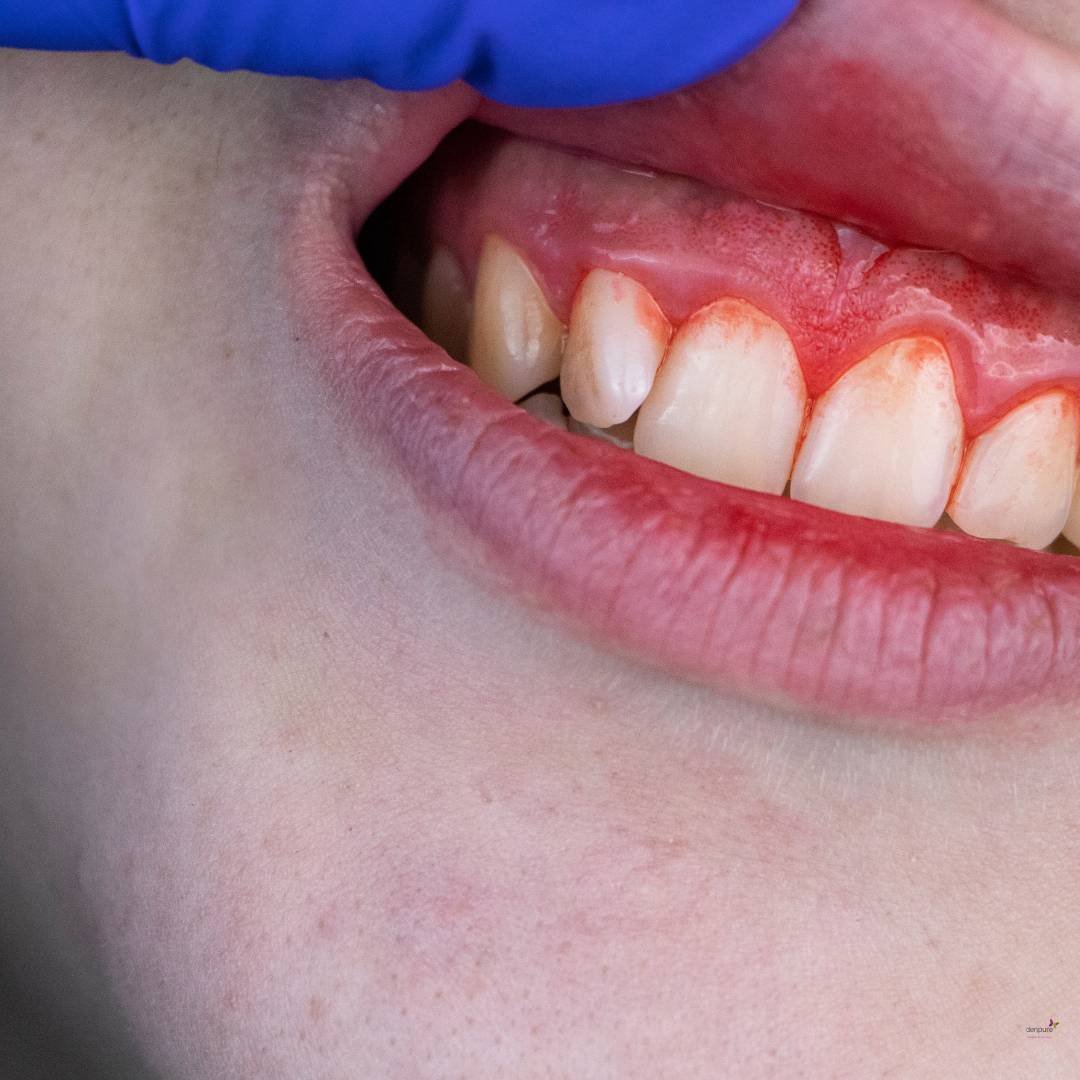You wouldn’t ignore bleeding from a grazed knee or elbow – and yet, many people still ignore bleeding gums.
Bleeding gums indicate there’s something bad happening in your mouth. The most common cause of bleeding gums is gum disease, which is when plaque (bacteria created after eating even very minute amounts of sugar), settles on, and suffocates your gum tissue.
A really great analogy of this is the following from Hygienist Kerri Rossiello.
She uses the analogy of a pool table. When bleeding gums persistent due to gum disease creating pockets (or holes) in your gums, the bigger the pocket becomes, the more the ball can fit inside.
Whilst this might be a good thing if you were playing pool, (helping you aim better!) it’s the opposite with your gums.
Once the pockets in your gums are large enough, bacteria can enter and cause inflammation underneath the gums, leading to more bleeding, and the destruction of the supporting ligament and bone.

Bleeding without brushing can be a sign of gingivitis (the early stages of gum disease) or periodontitis (the advanced stages of gum disease). However, it can also signify the presence of a serious disorder that like gum disease, needs examining by a dentist.
Bleeding gums can be a sign of a severe vitamin C deficiency (scurvy), and a low platelet count within your blood.
If you’ve noticed your gums are bleeding a handful of times, especially if you haven’t brushed, you should seek the advice of a dentist right away.
Gum disease is enough of a reason to try and make some changes to your diet and oral hygiene routine. But, if you need a bigger incentive, here it is.
Bleeding gums that cause gum disease can lead to wider health problems, such as heart disease. Meanwhile, people with Type 2 diabetes have an increased risk of gum disease.
What’s the link to these conditions?
Heart disease/gum disease link
Once bacteria reach through the pockets in your gums (those created due to gum disease), it can enter the bloodstream, causing hardened arteries.
With hardened arteries comes heart disease, and increased risk of heart attacks.
So, it’s important to remember that the bad bacteria in your mouth that build up can travel to elsewhere in the body and cause damage, and given half a chance, it will.
Diabetes (Type 2)/gum disease link
People living with diabetes often have lower saliva levels in the mouth. Since saliva is an essential cleansing element for getting rid of loose food particles and bacteria, this can increase your gum disease risk, as this debris can cause plaque to multiply, and travel into the bloodstream.
Diabetes has also been proven to increase the amount of glucose within saliva, which feed the harmful bacteria that go onto combine with the sugars you consume, forming plaque.
The good news is that it’s possible to lower your risk of both of these diseases by:
A study published in the Journal of Clinical Periodontology in 2019 found that pregnant women with gum disease are significantly more likely to go into early labour.
The study found that women that went into early labour recorded gum health scores 4 times lower than those who had a timelier birth.
Hormonal changes during pregnancy leave the gums much more vulnerable to plaque and swelling, increasing gum disease risk. It’s highly recommended that you regularly attend your hygienist appointments during pregnancy, to reduce your risk of premature labour.
At Denpure, we are fortunate to have a dentist with a special interest in the treatment and prevention of gum disease at the practice: Dr Mandeep K Birah.
Her focus is on patient education, and helping her patients understand the changes they can make to their oral hygiene routine, lifestyle and diet, in order to improve their long-term periodontal (gum) health.
We can also provide periodontal (gum disease) treatment that addresses all the symptoms of gum disease, including bleeding gums, gum recession (when your gums erode from your teeth), chronic bad breath, and loose teeth.
The sooner you come in to see us, generally the more straightforward the solution, so we encourage you to give us a call for an examination.
We will be able to give you a bleeding gums score, which helps you to understand in layman’s terms, how much damage the bleeding is posing to your gums.
Your gum health will never reach the point of no return – there’s always something we can do to improve your quality of life, prognosis, and risk of wider health complications.
We look forward to helping you.
Back to Blog